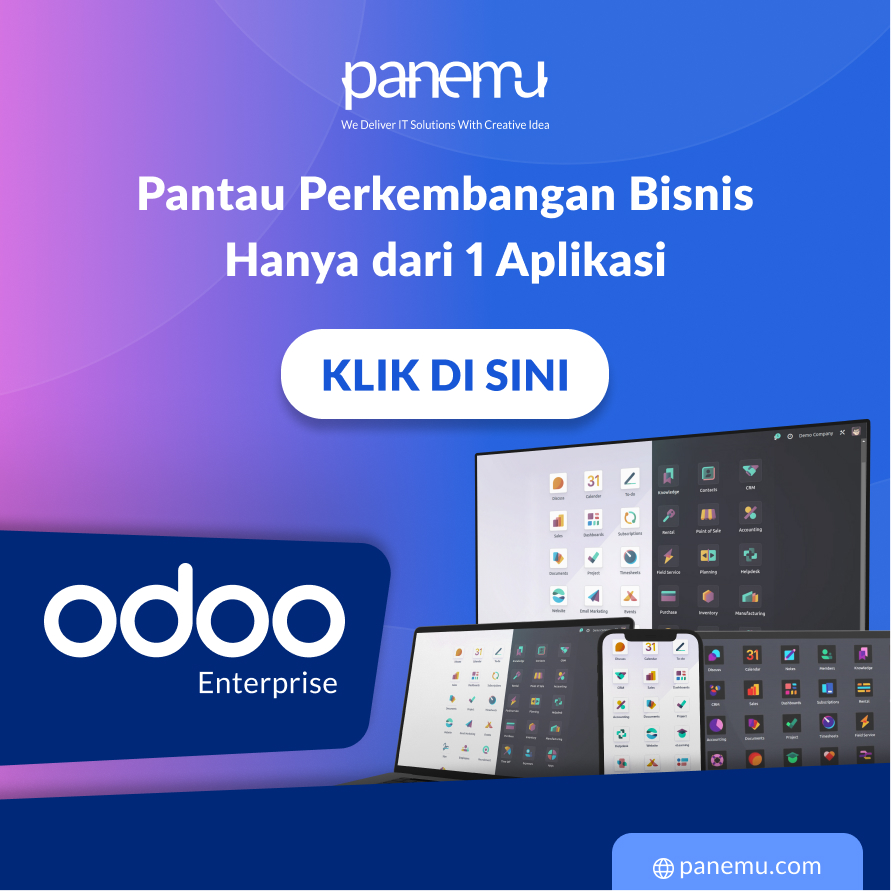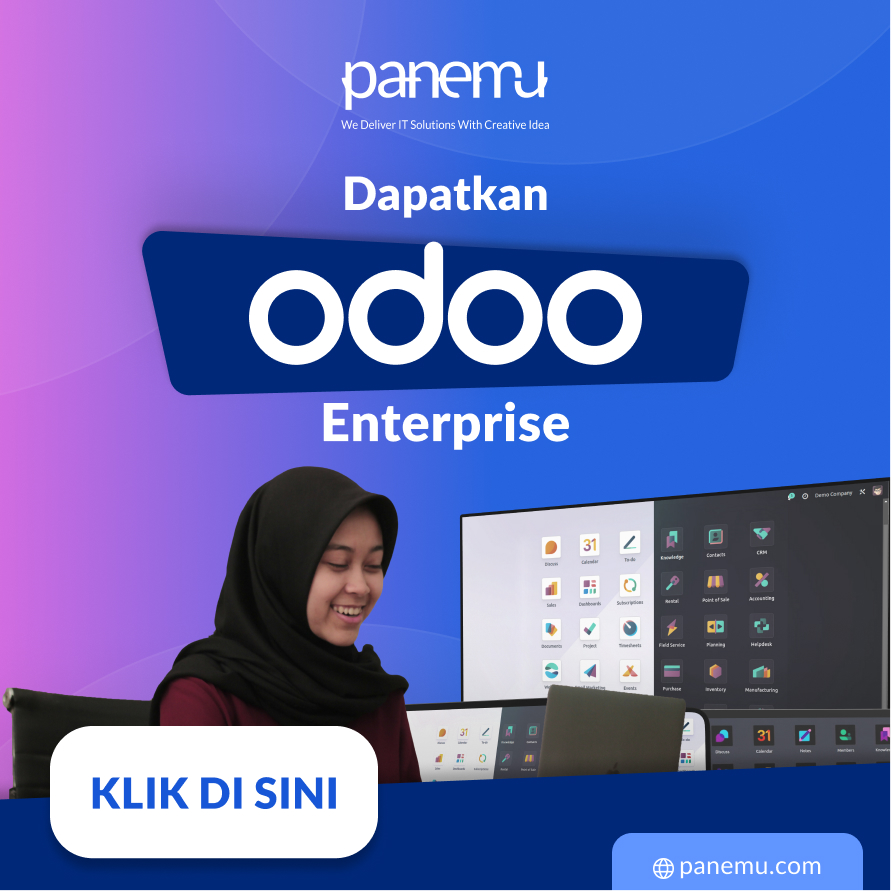Digital transformation continues to develop rapidly, and by 2025, Enterprise Resource Planning (ERP) technology is expected to become one of the key elements for large companies that want to remain competitive. As an official Odoo ERP partner, we at Panemu understand that the needs of corporate companies continue to change along with technological developments and market challenges. This article will review the main ERP technology trends that are projected to dominate the business landscape by 2025.
1. Cloud-based ERP is increasingly dominating
Cloud-based ERP has become the industry standard in recent years, and this trend will only get stronger in 2025. Advantages such as scalability, flexibility, and reduced infrastructure costs are making large companies choose cloud solutions.
Benefits of Cloud ERP for Large Companies:
- Global Accessibility: Employees can access the system anytime and anywhere.
- Reduction of Operational Costs: No need to manage physical servers, thereby reducing maintenance costs.
- Enhanced Data Security: Reputable cloud providers offer high levels of data encryption.
Corporate companies that adopt cloud ERP can more easily adapt to market changes, especially in the hybrid work era that requires system access from various locations.

2. Integration of AI and Machine Learning in ERP
Artificial Intelligence (AI) and Machine Learning (ML) are predicted to become an integral part of ERP systems by 2025. These technologies enable automation of complex business processes, prediction of market trends, and better decision making based on real-time data.
Example of AI/ML Implementation in ERP:
- Automated Data Analysis: AI can analyze financial data to detect certain anomalies or patterns.
- Predictive Maintenance: ML is used to predict when equipment needs to be repaired or replaced.
- Chatbot for Internal Support: Helps employees get information quickly without having to contact the IT team.
With AI and ML, companies can improve operational efficiency and gain deeper strategic insights.
3. Easier Customization and ERP Modularity
One of the main challenges in ERP implementation is the need to adapt the system to the company's specific needs. By 2025, ERP systems will be increasingly modular, allowing large companies to select and organize the most relevant modules without having to pay for unneeded features.
Modularity Advantages:
- Cost Efficiency: Only pay for used modules.
- Increased Flexibility: Easily add or replace modules according to changing business needs.
- Shorter Implementation Time: Because the focus is only on the required modules.
Odoo ERP, for example, offers a modular approach that allows companies to start small and scale as needed.
4. ERP with Real-Time Analytical Capabilities
Large companies need fast access to real-time data to support strategic decision making. ERP equipped with advanced analytical features will become a mainstream necessity by 2025. These features enable real-time monitoring of business performance, trend analysis, and automated reports.
Required Analytics Features:
- Interactive Dashboard: Provides a visual overview of business performance.
- Automatic Reporting: Save time in creating monthly or annual reports.
- Integration with Big Data: Enables analysis of larger and more complex data.
ERP with real-time analytical capabilities helps companies make faster and more informed decisions.
5. Increased Focus on Data Security
With increasing cybersecurity threats, data security will be a major focus in ERP development in 2025. Large companies that handle sensitive data must ensure that their ERP systems have strong security protocols.
Security Innovations in ERP:
- End-to-End encryption: To protect data during transmission.
- Multi-Factor Authentication (MFA): Increases layers of protection when logging in.
- Proactive Security Monitoring: A system that can detect and respond to threats automatically.
Data security is not only about protecting the company, but also maintaining the trust of customers and business partners.
6. ERP Integrated with IoT
The Internet of Things (IoT) is becoming an important part of large company operations, especially in the manufacturing and logistics sectors. By 2025, ERP is expected to be increasingly integrated with IoT to provide greater visibility into operational processes.
Example of IoT Integration:
- Inventory Monitoring: IoT sensors can provide real-time updates about stock items.
- Production Automation: ERP integration with production machines to increase efficiency.
- Shipping Tracking: Provides accurate data about location and delivery conditions.
With IoT integration, companies can increase transparency and operational efficiency.
7. Adoption of Blockchain Technology in ERP
Blockchain offers transparency, security and efficiency in data management. By 2025, this technology is expected to be widely adopted in ERP, especially for large companies that have complex supply chains.
Benefits of Blockchain in ERP:
- Transparent Transactions: Record every transaction in the supply chain accurately.
- Fraud Risk Reduction: Data cannot be changed or manipulated.
- Improved Compliance: Facilitate audits and ensure compliance with regulations.
By integrating blockchain, large companies can increase trust and efficiency in their operations.

8. More Intuitive User Experience (UX).
Traditional ERP systems are often known to be complex and difficult to use. However, by 2025, focusing on user experience will be a priority. Large companies want an intuitive system so employees can easily understand and use ERP features without extensive training.
Innovation in ERP UX:
- User Friendly Interface: Simple but functional design.
- Personalize Dashboards: Each user can set the display according to their needs.
- Mobile-Friendly ERP: Ensure the system can be accessed easily via mobile devices.
A good user experience can increase employee productivity and speed system adoption.
Conclusion
ERP technology trends in 2025 will focus on advanced technology integration, security, flexibility, and better user experience. Large companies that want to remain competitive must start preparing themselves to adopt this trend. As an Odoo ERP implementation partner, Panemu is ready to help your company face the future with innovative and relevant ERP solutions.
If you want to find out more about how ERP can help your company's digital transformation, visit Panemu or contact our team for a free consultation.